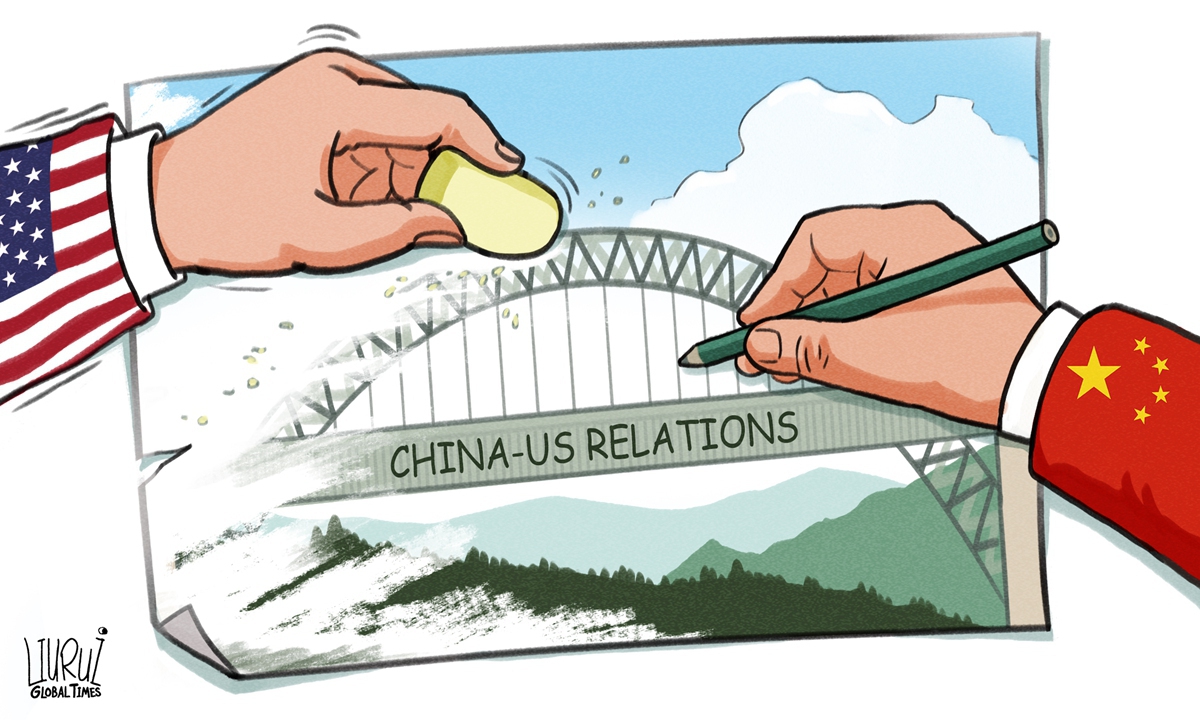
China-US relationship. Illustration: Liu Rui/GT
No matter how many trial balloons Washington floats through the media on visiting China, the specific policies and measures the US adopts in dealing with China is the only criterion for judging US sincerity and the only thing which interests China.US Treasury Secretary Janet Yellen plans to visit Beijing in early July for the first high-level economic talks with her Chinese counterpart, Bloomberg reported on Tuesday, citing people familiar with scheduling. She would be the second US cabinet official to travel to China after US Secretary of State Antony Blinken's recent trip to Beijing.
On the same day when news broke out on Yellen's possible visit to China, another story appeared that the Biden administration is preparing an executive order to control venture-capital and private-equity investment in China and other countries the US government considers adversaries, meaning that US private-fund managers that have stayed invested in the Chinese technology sector may soon face new restrictions, The Wall Street Journal reported on Tuesday.
While it remains unclear whether the reported visit under plan will really happen, it gives the impression that Washington's politicians are once again trying to coax China into cooperating with their boring political show, even though China is already sick of these "two-faced" games played by US politicians.
Over recent months, the US government has repeatedly floated trial balloons through different media outlets, showing its interests and enthusiasm in engaging in high-level communication with China. A CNN report in May said that the Biden administration was looking at arranging a series of possible visits to Beijing by top administration officials in the coming months as part of an effort to reengage with China on substantive issues.
It may be selling well in the US political arena. But for China, our focus has never been which senior US officials will come to China to say nice or new things about China-US relations, but whether the US has the sincerity and specific policy to really improve and stabilize relations with China. If anything, the more visits by US politicians that focus on showing hypocritical sincerity instead of improving bilateral ties, the more difficulties mutual trust will face.
Chinese Foreign Ministry Spokesperson Wang Wenbin said in a press conference in May that "What matters is that the US cannot keep raising the issue of communication on the one hand, while on the other, keep suppressing and containing China. The US cannot say one thing but do another."
Facts show that the US has lost control on many issues, particularly economic ones, and realizes many of their problems can only be addressed or relieved with the help of China, such as high inflation. For instance, in remarks for a May hearing of the Senate Banking Committee, US Assistant Treasury Secretary Elizabeth Rosenberg said that "We seek expanded engagement with the PRC to work through the difficult issues that we face."
Ironically, however, even as US officials acknowledge the objective need for China's cooperation, the US has never corrected actions aimed to curb, siege and suppress China while continuing imposing bans on high-tech exports to China, blacklisting Chinese entities, and challenging China's interests in areas such as the Taiwan question. Since 2018, the US government has blacklisted more than 1,100 Chinese entities citing various concerns over national security, US interests and human rights, and allegations like conducting genetic analysis and surveillance activities for Beijing, supporting a so-called spy balloon, to selling fentanyl making equipment.
Under these circumstances, it is rather brazen for the US to keep putting forward trial balloons on visiting China. It is sickening hypocrisy for the US to insist on making cooperative gesture as its constant efforts to contain China already lay bare that it has no intention of improving bilateral relations. Real improvement in bilateral relations can only be built on the preconditions that the US forms a correct perception of China, respects China's red lines, stops undermining China's sovereignty, security and development interests.
Last but not least, high-level communications between China and the US cannot be prompted by floating trial balloons through media, which is abnormal and may easily lead to problems. The root of the anomaly lies in the US, which needs to reflect on its "two-faced" behavior.



